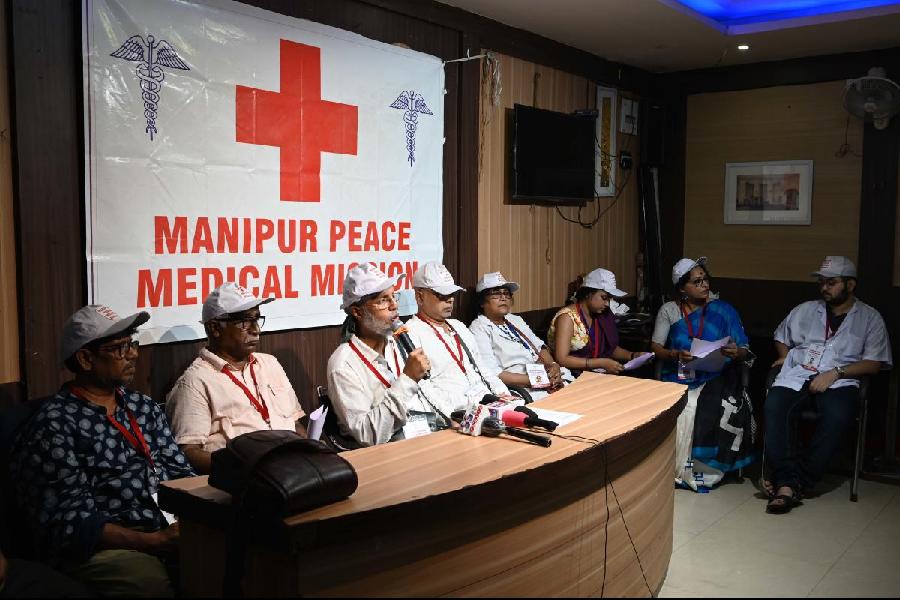A medical team from Bengal that visited some of the relief camps in Manipur said many of the displaced and distressed people there were still in trauma and unable to sleep.
They can still hear children’s cries and see houses aflame when they seek some rest.
The camps lack adequate healthcare services and nutrition, members of the team pointed out, urging government intervention.
The 13-member team — comprising doctors, medical students, health workers and rights activists — spent around a week in the strife-torn state, visiting camps in both Kuki and Meitei areas from September 4 to 9.
“PTSD (post-traumatic stress disorder) has multiple manifestations. Many inhabitants have a genuine lack of appetite. Some others have not been able to sleep properly for months. Many others have physical pain that cannot be otherwise explained. It has also affected children in the camps,” Bhaskar Chakraborty, a doctor who was part of the Manipur Peace Medical Mission, said during an interaction with reporters at the Press Club in Calcutta on Tuesday.
United in pain
The team members visited six Kuki camps in and around Churachandpur and two Metei camps, one each in Moirang (in Bishnupur district) and Wangkhei (in Imphal East district).
“We did not find a single Meitei in the Kuki areas. Similarly, we did not spot one Kuki in the Meitei areas. The division runs deep. But the condition of the victims in both camps is similar. The trauma of losing their loved ones and seeing their houses torched is haunting both Kukis and Meiteis,” said Biplab Bhattacharya, a rights activist who led the mission.
In a camp in Chura-chandpur, the team members found a woman who suffered from breathlessness every time she heard her child crying.
In a camp near Imphal, they met a woman who said she had not had sound sleep in months. Every time she dozed off, she would hear children wailing.
The Manipur clashes that erupted on May 3 have killed at least 182 people and displaced over 67,000.
“The people have been scarred for life. If they do not get counselling soon, things will get worse. But at a time when access to basic medicines is a challenge, access to mental health experts seems far-fetched,” said team member Tiyasha Dey, a final-year MBBS student.
So near, yet so far
Government intervention seemed minimal in the camps, the members said.
“Both Kuki camps in the hills and Meitei camps in the plains were community-driven. But the organisers of the Meitei camps seemed to have more access to basic amenities than their Kuki counterparts,” said Bhattacharya.
The movement of people and goods between the hills and the valley has come to a complete halt, said the mission. “Aid from the plains is not moving up to the hills. Kukis have also resorted to blocking roads in the hills to prevent items from going down,” said Bhattacharya.
Imphal, the capital of Manipur, is around 70km from Churachandpur.
The team members said the camps in Churachandpur have to look towards Aizawl — the capital of the neighbouring state of Mizoram, around 350km away — for supplies.
The road connecting Aizawl and Churachandpur, NH102B, is in a “pathetic condition”. It took the medical team 27 hours to reach Churachandpur from Aizawl by that road.
Cramped spaces
Between September 4 and 9, the team treated over 70 people every day on average.
“The camps are cramped. As a result, contagious diseases are rampant. Conjunctivitis, viral bouts of cough and cold and respiratory problems have affected many people,” said Chakraborty, the doctor.
The team members said they saw more children and women in Kuki camps than in Meitei camps.
“The ration at the camps is mostly rice and lentils. The absence of vegetables, eggs, meat or fish is very concerning, especially for children and pregnant women,” said Sumita Das, another doctor on the team.
Apathy
A young doctor, who treated people in “what felt like a war-zone” for the first time, said the apathy of the government “was appalling”.
“Prejudice and bias were created in the minds of people. There was no peace initiative from the government. The government was virtually absent,” said Anubhav Mondal, an intern with a government medical college.
Pointing out that the camps lacked the UN humanitarian relief standards, the peace mission questioned the role of the state and central governments.
“The governments cannot wash their hand of.... The government has to take responsibility of the health and education of its people,” the mission said in a statement.
